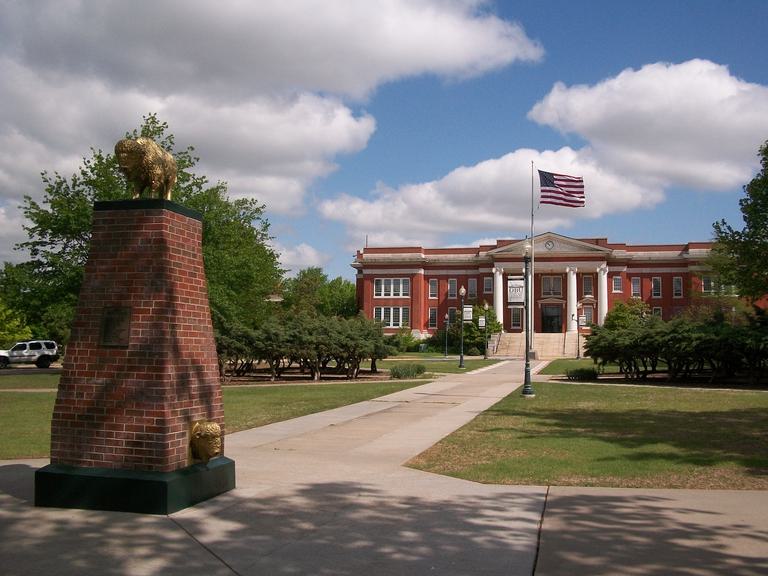
Higher Education
Staci Elder Hensley | May 6, 2021
Landmark lawsuit targets Christian higher education
Staci Elder Hensley
One of Oklahoma’s largest faith-based universities is among 25 higher education institutions named in a federal class-action lawsuit recently brought against the U.S. Department of Education.
Filed by the nonprofit Religious Exemption Accountability Project (REAP), the lawsuit, Elizabeth Hunter, et al. v. U.S. Department of Education, is being brought against the department on behalf of 33 LGBTQ students who are current and past students at Christian colleges and universities, including Oklahoma Baptist University (OBU).
The suit claims that the current religious exemption which allows these schools to have traditional faith-based policies in place is unconstitutional because these schools receive federal funding.
“The Plaintiffs seek safety and justice for themselves and for the countless sexual and gender minority students whose oppression, fueled by government funding, and unrestrained by government intervention, persists with injurious consequences to mind, body, and soul,” reads the lawsuit, filed March 29, 2021, in U.S. District Court in Oregon. “The Department’s inaction leaves students unprotected from the harms of conversion therapy, expulsion, denial of housing and healthcare, sexual and physical abuse and harassment, as well as the less visible, but no less damaging, consequences of institutionalized shame, fear, anxiety, and loneliness.”
Among the student plaintiffs is Tristan Campbell, a former OBU student who claims that he experienced discrimination from faculty, staff, and students after publicly declaring himself to be bisexual.
Campbell attended OBU from August of 2013 to December of 2015. After “coming out” during his sophomore year and speaking out on social media, he said, he received an official reprimand from the school, was fired from his job as a resident assistant, harassed by fellow students, and later dismissed from the university without notice.
“OBU forced me to choose between my own beliefs and convictions about myself, my identity and what was best for my mental health, and OBU’s beliefs and convictions about me and my identity, which were harmful to me,” Campbell said.
Like most faith-based higher education institutions, OBU requires students to adhere to a strict code of conduct that follows traditional Christian orthodoxy, and permits sexual relationships only between married, heterosexual couples. While the university cannot comment on pending litigation, Paula Gower, associate vice president for marketing and communications, provided the following statement:
“OBU exists to equip students as future leaders who will impact the world for the Gospel of Jesus Christ through their vocations, integrating faith and knowledge from a biblical, Christ-centered worldview. Founded in 1910 by the Baptist General Convention of Oklahoma, OBU continues to operate under the authority of Oklahoma Baptists in accordance with established religious practices and beliefs. As a caring Christian community, OBU expects all students and employees to display the love of Christ and treat every person as a bearer of God's image, worthy of respect, value, and dignity. Serving and caring for a diverse student body, OBU has zero tolerance for harassment, violence, bullying, and assault.”
“The end game is that faithful Christian educational institutions be denied tax-exempt status and taxpayer funding completely.” —Prof. Robert Gagnon
Faith-Based Education Under Attack
REAP’s lawsuit comes at a time when the issue of federal funding for faith-based schools is under renewed scrutiny after U.S. House passage of the “Equality Act.” Passed in February by the House but currently stalled in the Senate, the act is a sweeping piece of legislation that adds gender identity and sexual orientation as protected classes under federal law. At the same time, it significantly weakens traditional exemptions normally applied for religious groups and individuals.
The REAP lawsuit is designed to prevent these “carve-out” exemptions, arguing that these exemptions single out LGBTQ students as a “socially despised group for legal disfavor.”
If it becomes federal law, the Equality Act would spell disaster for faith-based schools around the country who could potentially lose federal funding and even accreditation, said Robert Gagnon, Ph.D., professor of theology at Houston Baptist University and a nationally known expert on faith-based education and sexual ethics. If the act is passed, he said, faith-based schools would be forced to either give up funding or espouse policies that directly contradict their faith tenets.
“This is an attempt to ostracize and shame people who adhere to Jesus’s teachings,” Gagnon said. “If college education is required to endorse and provide special accommodations that violate these teachings, then this entails compulsory speech. That’s what these laws are designed for, and a lot of college institutions will be tempted to fold on this important issue of faithful Christian education.
“The end game is that faithful Christian educational institutions be denied tax-exempt status and taxpayer funding completely, such as federal student loans and research grants, unless they capitulate to an extreme left-wing sexual agenda,” he continued. “Eventually, even their accreditation will be challenged. We are looking down the road at a potential demise of faithful Christian education in the United States.”
According to REAP, there are approximately 600 four-year, degree-granting nonprofit Christian colleges in the United States, one-third of which have policies against LGBTQ students in their student code of conduct policies.
[For more stories about higher education in Oklahoma, visit AimHigherOK.com.]
(Image: OBU Oval)
Staci Elder Hensley
Independent Journalist
Former newspaper reporter Staci Elder Hensley is a freelance writer, editor, and columnist. A graduate of the University of Oklahoma, she is a former news coordinator for both the Oklahoma Tourism and Recreation Department and the University of Oklahoma Health Sciences Center. She served as a regular columnist for The Daily Oklahoman and Distinctly Oklahoma magazine, and her credits also include articles produced for multiple state and national publications, including The Journal Record, The New York Times, The Dallas Morning News, and others.